Split - Connecting Sport and Culture: City, Tourist Board, Hajduk and More Present EU Project
December 20, 2019 - An EU project in Split foresees a Poljud Museum, Hajduk Interpretation Center, new Poljud stadium roof and better stadium accessibility, as well as sports and cultural routes throughout the city.
Dalmacija Danas writes that a meeting was held with representatives of the City of Split, HNK Hajduk, the Split Tourist Board, Sports Facilities, RaST Development Agency and the Naš Hajduk Association with representatives of Kocka d.o.o. and Osam d.o.o., as part of the EU project "Split - A City Connecting Sport and Culture".
At the meeting, they presented the elaborated project technical documentation, that is, the museum concept and establishing the future Poljud Museum and Hajduk Interpretation Center, which will cover 2.323 m2 on three floors within the Poljud Stadium, below the eastern stand.
At the beginning of the meeting, Deputy Mayor Nino Vela welcomed all present and thanked everyone for their dedicated work and cooperation.
On behalf of the International and EU Projects Office, Radojka Tomasevic welcomed everyone present and informed the attendees about the project implementation and project documentation, which was prepared during the previous project implementation. She emphasized the complete project documentation for the reconstruction and rehabilitation of the Poljud Stadium roof, conserving the base of Stadium, as well as the necessary rehabilitation projects throughout the Stadium, which include ensuring accessibility for persons with disabilities.
Documentation was also developed to establish sports and cultural routes that would link locations from Bacvice, the Firule Tennis Courts, and the Basketball Hall at Gripe, to the Holy Trinity Church at Poljud, the pools and stadium at Poljud, the Ancient Port at Spinut, the pools of Mornar and Jadran, the POŠK port, the Olympic trail on the West Coast, the Ad basilicas Pictas sites, the old Hajduk stadium at Stari Plac, the Croatian House building at Tonciceva, and the Old Town Hall at Pjaca.
For the park at the site of Ancient port in Spinut, a conservation base, a study of the greenery, the architectural design of the educational park, and the main architectural design of the interpretive center - a pavilion in the Scientific and Educational Ancient port park (museum and execution project) were made.
The Strategic Branding Plan of the Split Integrated Program as a City of Sport and Culture, as well as the Feasibility Study and Cost-Benefit Analysis of the Split Integrated Program as a City of Sport and Culture, will be finalized by the end of the project.
Special thanks were given to project manager Hrvoje Akrap and project coordinator Ana Jerkunica for their dedicated work in the implementation of the project from the very beginning.
Designer Marko Barisic and project manager Jelena Devcic from the company Kocka d.o.o., and Darko Babic, director of Osam d.o.o., presented in detail the museum solution of the entire space of the Poljud Museum and the Hajduk Interpretation Center.
Thus, the Poljud Museum and the Hajduk Interpretation Center plan to offer visitors a range of new facilities using state-of-the-art technologies and multimedia equipment (9D) to create an experience and interpretation of cultural heritage and sports, presenting to the general public a valuable architectural and constructive solution for the Stadium, which is also individually protected immovable cultural property, entered in the Register of Cultural Property of the Ministry of Culture of the Republic of Croatia, in the category of profane architectural heritage, but also with the rich history of Hajduk.
All present expressed their satisfaction, from the Deputy Mayor, Nino Vela, the President of the Management Board of HNK Hajduk, Marin Brbic and his associates to representatives of the Tourist Board, the public institution Sports Facilities and the Naš Hajduk Association, emphasizing that the project will surely provide a new, unique tourist offer and product based on Split's underused history of sports and culture.
It is a considerable task for everyone to provide the means to implement all the planned activities as soon as possible, from the reconstruction of the stadium roof for which project documentation has been prepared, as well as necessary remediation projects and ensuring accessibility of the entire stadium to persons with reduced mobility, to establishing sports and cultural routes at various localities in the city, and branding Split as a city of sport and culture.
Recall, the EU project Split - City Connecting Sport and Culture, has been implemented since December 1, 2016, until December 31, 2019. The project developer is the City of Split, and the project partners are the Split Tourist Board and the Split Sports Facilities public institution. The total value of the project is HRK 6,392,000.00, of which the grant amount is HRK 4,999,822.40 financed by the European Regional Development Fund.
To read more about lifestyle in Croatia, follow TCN's dedicated page.
Photos: City of Split Reveals Potential Designs of New Pazar and Fish Market
December 13, 2019 - It’s no surprise that the green market or ‘pazar’ in Split is due for an upgrade, and the famous fish market has become too small for today's needs. Thus, the City of Split has set out to renovate both city symbols to maintain their primary functions - selling fish and food products - while preserving the recognizable images of the city.
The City of Split writes that Mayor Andro Krstulovic Opara and architect Dinko Peracic, in front of the architectural office ARP, presented two architectural and spatial studies for the design of pa zar and the fish market.
Concerning pazar, the conclusions showed that it is optimal to keep the trade of produce on platforms under the existing deciduous trees and parasols, while improving conditions by bettering the equipment and arranging and organizing the space with new trees. Dairy, meat and similar products, which require controlled conditions, would be concentrated east of the St. Dominic monastery. In the southern part, it would be optimal to form fixed buildings that would spatially separate the market from the waterfront, but also provide good pedestrian connectivity, and accommodate non-food items.
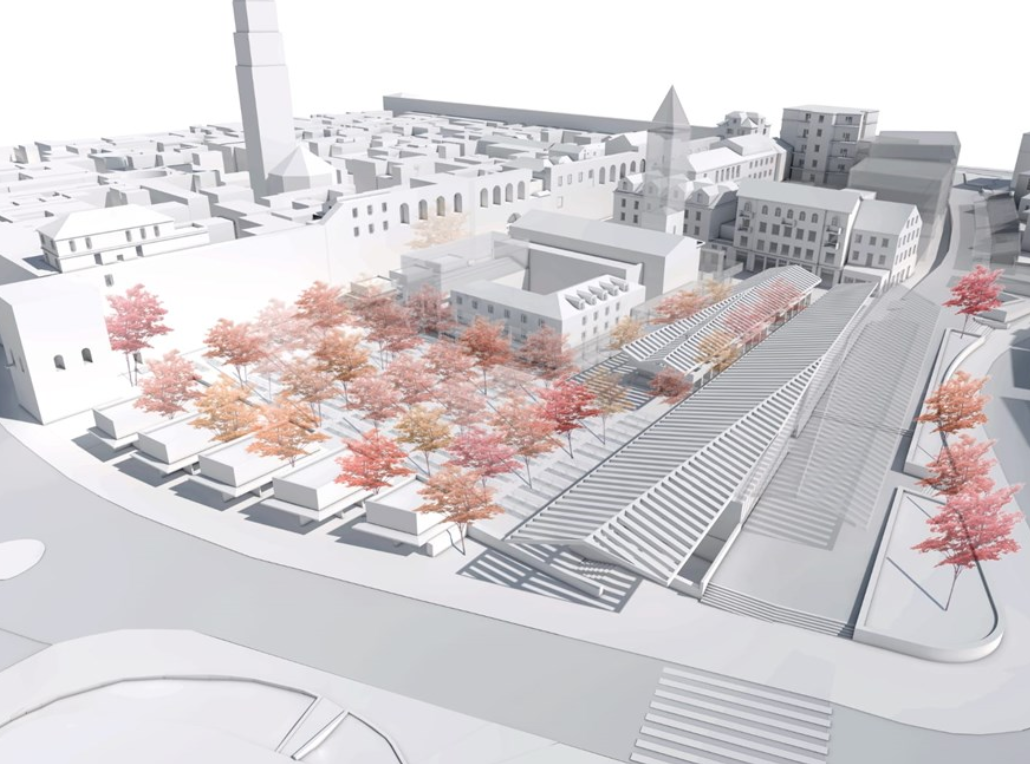
Of particular importance for pazar to function is opening the pedestrian traffic that is now blocked by kiosks, and Hrvojeva Street would be transformed into a full-width pedestrian zone. Sellers would only be allowed to operate with mobile equipment set up under strict guidelines.
The fish market, considering all the architectural options, would be expanded to Marmontova with a new section of the same height, and the old and the new part of the market would constitute one complete building. The front of the fish market requires a veranda that would protect customers at the entrance, protect the glass facades from the sun, and bring new quality to Marmontova’s public space. Thus, this upgraded section would become, as appropriate, a covered square used for other purposes outside the opening hours of the fish market.
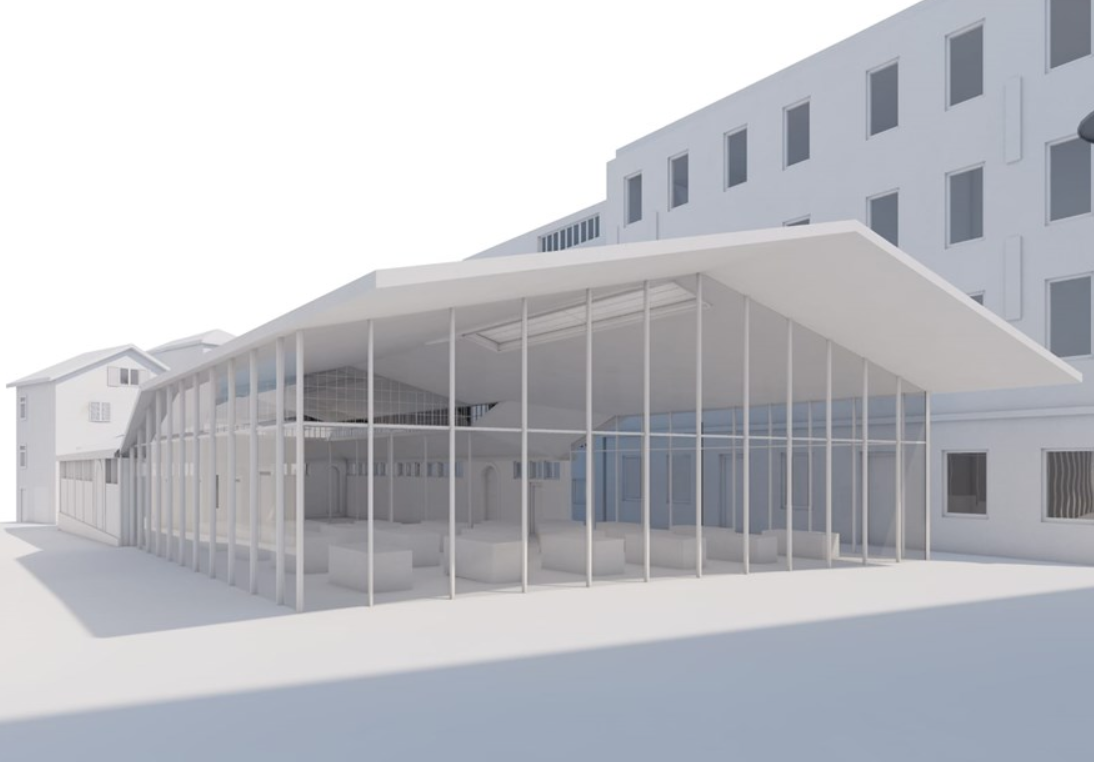
By expanding and opening the fish market, the city receives new content, based on all its traditional values. Its equipment would be adapted to the modern conditions of selling fish on stainless counters, and all necessary service facilities would be installed inside the fish market as a separate element.
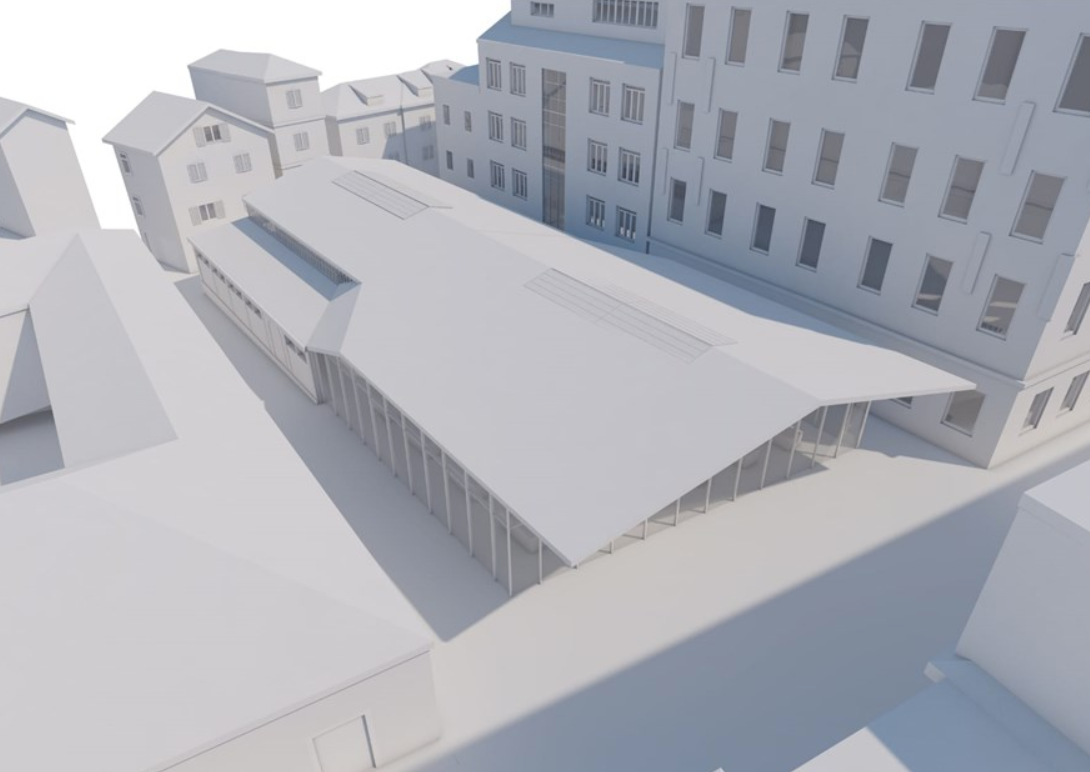
As Peracic emphasized, these are not finished conceptual designs, but more about the intelligence of the space, which contains everything necessary for the realization of these projects to succeed:
“It is important not to fall into complete solutions, but to see what is needed. We did it; this is the basis for the future design.”
"More detailed planning of the realization of these projects can now begin, we are considering the stages of renovation to enable its efficient realization, but more importantly, to ensure that the pazar and fish market operate during the works,” the mayor added.
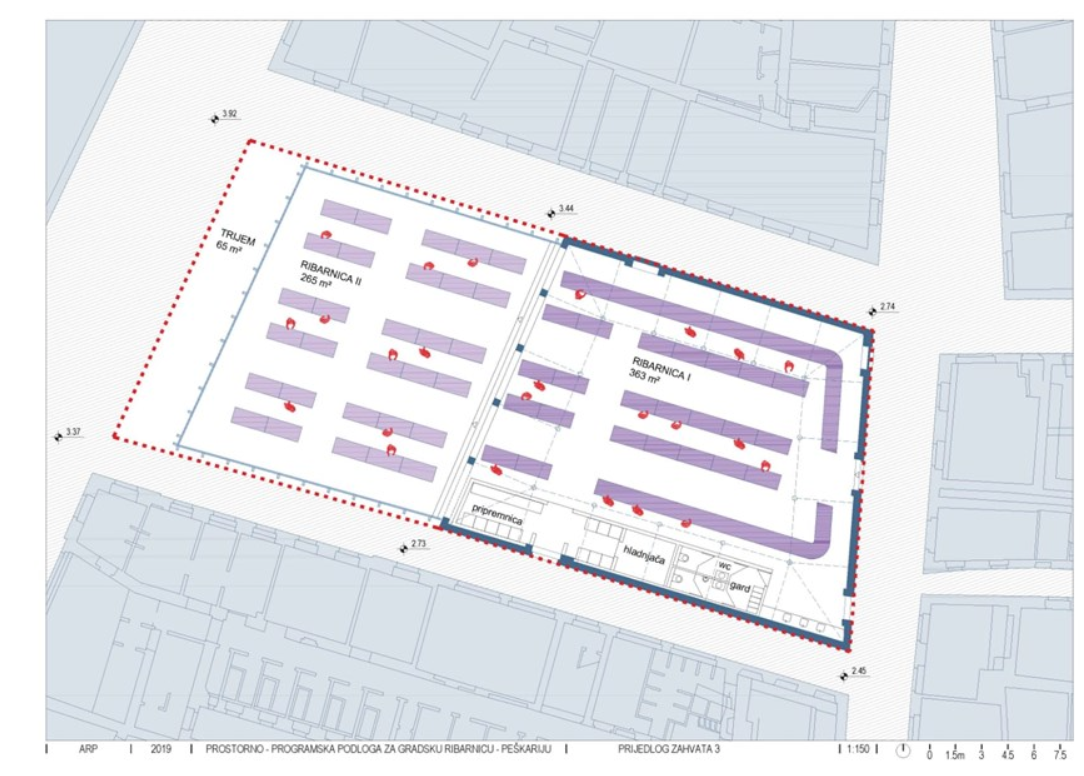
In order to qualitatively prepare for these renovations, several additional preliminary activities are planned before the next stages of the project documentation is prepared. These include detailed planning of terms of sales points in cooperation with the vendors, defining precise conditions for the development of architectural design in cooperation with the Conservation Department, making a snapshot of the existing state of the building and installations, preparing conservation studies, drafting project documentation through the procurement process, business plan and securing funding.
To read more about lifestyle in Croatia, follow TCN’s dedicated page.
How Do Special Programs and Events Impact Offer of City? A Look at Split
December 10, 2019 - What is the real impact of special programs on the development of a city's tourist offer? A look at Split.
HRTurizam writes that during Advent, all major Croatian cities offer several special events and programs - and in the last few years, increasing attention has been given to this part of the tourist offer, in which tourist boards play a major role as leaders of destination management.
With this in mind, the first scientific study of special city programs was conducted in the function of growth and development of the offer of the city of Split. The authors of the research are Doctorandus Dino Bruža and Master of Economics and Professor Andreja Rudančić, Ph.D., who presented the research findings at the International Scientific Conference "International Management Research" in May 2017 in Opatija.
Scientific work on this topic has been published in the book INTERDISCIPLINARY MANAGEMENT RESEARCH XIII., Barković, Dražen; Runzheimer, Bodo, editor (s), Opatija: Faculty of Economics in Osijek; Hochschule Pforzheim, 2017 (p.121-138).
The purpose of this scientific research is to show the real impact and role of programs and implementing special city programs on the development of the tourist offer of the city of Split, primarily from the aspect of the Split Tourist Board.
Author Dino Bruža emphasizes that the aim of the paper is to determine to what extent and in what way specific city programs affect the increase of revenues, and the extent of the level of tourist expectations and satisfaction, through the analysis of key tourism indicators. He also points out that special city programs in the tourist offer of the destination represent a unique experience on the market
“There are two main goals of implementing specific city programs: to increase economic effects on the one hand and to increase the level of tourist satisfaction on the other. Contemporary tourists have a high degree of expectation, which is a great challenge in creating tourism experiences. Event management, in this case, represents a significant segment of destination management, which deals with the planning, organization, guiding, management, and control of these special programs.
In addition to contributing to the volume of content offered, special city programs also affect extending the tourist season, that is, reducing the seasonality of tourism and hospitality businesses, increasing revenues and attracting new guests while retaining existing tourists. Executing special city programs has a multiplier effect, as it, directly and indirectly, affects revenue growth, encourages additional hiring of skilled personnel, creates a virtual platform for a large number of manufacturers and providers of products and services and affects the development of the entire destination. That is why there is a need for strategic planning of special programs and for monitoring their success, and for providing all the necessary resources for re-implementation,” said Dino Bruža, adding that with this approach, the city of Split becomes a unique tourist destination, offering a whole range of special events and programs.
Dino Bruža also notes that in organizing special events and programs, special attention should be paid to implementing information and communication technology, for several reasons.
“The focus of this scientific research is on the interdependence of information management, communication technology and designing special programs. Opportunities and ICT impact assessments on the business performance and competitiveness of the specific program need to be continually conducted. As the author states, the number of special programs is growing at an unprecedented rate, various management, control and leadership models are being used, but what is common to most is the inevitable adaptation to current trends in information and communication technology. Specific programs by themselves did not play a major role in the past, but served solely to increase spending, which is still one of the goals today. However, a new goal is emerging today, for the program to be an end in itself and to take on the existing "empty" part that occurs in the offer of every segment on the market,” said Bruža.
In accordance with all the above, author Dino Bruža is conducting new scientific research in order to produce a doctoral dissertation, whose results he will present in his doctoral thesis, which he will defend at the Faculty of Economics in Osijek.
To read more about travel in Croatia, follow TCN's dedicated page.
Karepovac Then and Now: City of Split Releases Photos of Landfill Progress
November 23, 2019 - Split mayor Andro Krstulovic Opara praises the work done on rehabilitating the Karepovac landfill in Split over the last two years.
On November 22, 2017, the rehabilitation of the infamous Karepovac landfill began. In the past two years, the former eyesore of Split has become a rehabilitated and landscaped area. After about one million cubic meters of old waste was moved and transformed in the first year of operation, in the second year, transport, hydro and electrical infrastructure was built, and a landfill cassette of about 70,000 square meters with slopes for one million cubic meters of new waste.
Mayor Andro Krstulovic Opara said of Facebook that he is satisfied with the work done so far.
“It was a time of temptation and challenge, as I announced on the first day of rehabilitation, November 22, 2017. Congratulations to the workers and the whole team involved in this project, especially since they didn't miss even the challenging moments that followed us from the beginning. It wasn't easy, but after more than five decades of carelessness, Split's shameful hill was repaired. Thanks to the citizens for their patience, especially those from Dračevac, Kila, Mejaši, Kamen-Šine, Sirobuja, and the neighboring Solin, as they can now raise their children in a healthy environment,” said the mayor, emphasizing that the fight for health and a clean environment is the first priority of the city government, which they will continue to work on.
“I will only be completely satisfied and proud when we, together with Čistoća, lead the responsible disposal of our waste. We can and must do it better, for the benefit of Split and future generations,” Opara Krstulović concluded.
Recall, the first phase of the Karepovac rehabilitation was completed in May 2018. The second phase of Karepovac’s rehabilitation envisages its greening, and the third and final phase foresees the sanitation of the area where the garbage will be disposed of in the future, and finally the closure of the landfill, assuming that all the waste is driven to Lećevica.
To read more about lifestyle in Croatia, follow TCN’s dedicated page.
Split Advent Program Revealed: The Details
November 8, 2019 - This year’s Split Advent promises an abundance of music and fun, and will also awaken nostalgia in some of its visitors.
Visitors to Split from November 30, 2019, to January 2, 2020, will hop on a retro time machine and recall some of the forgotten verses, games and flavors of the city. Across five weeks, Advent guests will enjoy a plethora of Christmas delicacies at various Advent locations, and send thousands of unique postcards to the world from photo corners on Vidilica and Matejuska.
Dalmacija Danas reports that a new edition of Split Advent was announced at today's press conference held on a branded bus that will run the free Advent line. The attendees were greeted by the host of the Advent bus, the director of Promet, Miroslav Delić, who emphasized the importance of good cooperation with the Split Tourist Board, on whose initiative two free Advent lines will be introduced this year. The new lines will run on weekends all day. In addition to Promet, HZ Passenger Transport, in cooperation with the Split Tourist Board, will offer free return rides to the citizens of Split, Solin, Kastel and Trogir every Saturday and Sunday to the city center. Free transportation on Saturday and Sunday mornings and afternoons will be provided by the suburban train between Kastel Stari - Split - Kastel Stari.
Mayor of Split, Andro Krstulovic Opara, greeted all those present.
“We are proud that Advent is becoming one of the most important manifestations of our city, which is confirmed by the increasing involvement of numerous institutions, associations, local communities. We are sure that it will attract a large number of visitors, especially citizens. We are breaking records during the tourist season, even this time when almost the entire Adriatic was in the minus. Christmas time is the time for us, our children and our citizens. We have designed Advent festivities to bring our citizens Christmas magic and awaken the good old feelings. We want to feel good together with our citizens, let's smile, let's be happy, that's our goal this Christmas!
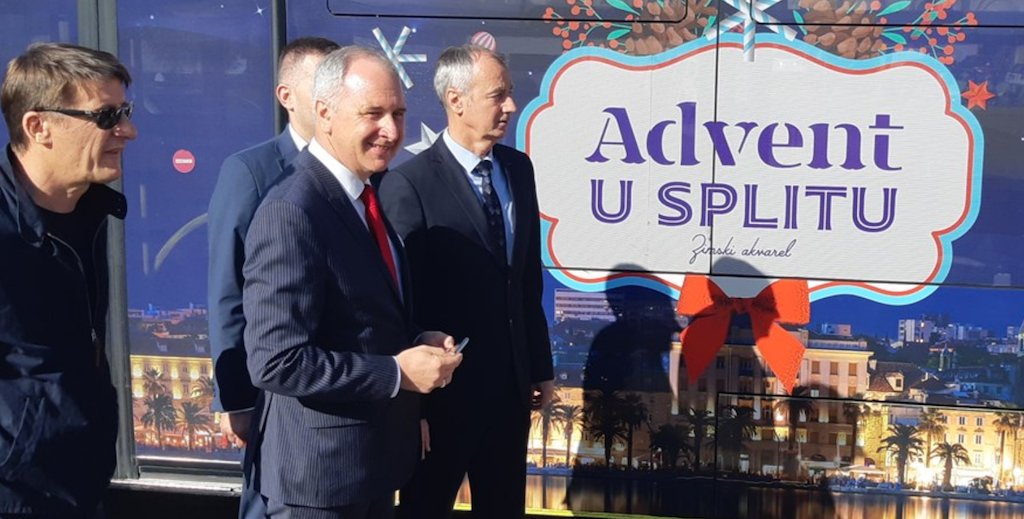
This year, it was our wish that all visitors awaken the playfulness and emotion of the old times. We have introduced new locations and revived traditional locations with ice skating rinks, photo corners, retro exhibitions, themed programs, dances and many surprises which will we ride together on our retro time machine. Let's add that during Advent last year, tourist numbers increased by 17% in arrivals and 21% in overnights, and judging by this year's interest of foreign media, Split is becoming a genuinely unavoidable Advent destination.”
The director of the Split Tourist Board, Alijana Vukšić, added:
“The CEO of Spalatum DMC, Ante Sunjic, emphasized that this year's program on the Riva is particularly rich and diverse. The entertainment program is full of theme nights and performances of well-known musical names. Advent will open by Gustafi, and visitors to Advent will be entertained by Giuliano and Diktatori, Alen Nizetic, Marko Pecotic & band, the Vatra group and numerous other performers. A special treat will be Tedi Spalato’s Christmas concert and we will have a traditionally good time for New Year's Eve. Klapa Intrade and Tomislav Bralic will create a cheerful Dalmatian atmosphere, while Jelena Rozga is in charge of the party until the morning hours.”
She added that numerous sponsors recognized the event, and also thanked "Coca-Cola as a sponsor of love and warmth, OTP Bank as a sponsor of joy, the Croatian Lottery as a sponsor of memories, Radio Dalmatia as the media partner and sponsor of playfulness, and all others who have recognized the importance of events such as Pik Vrbovec, Ožujski, Procurator and Bio Planet."
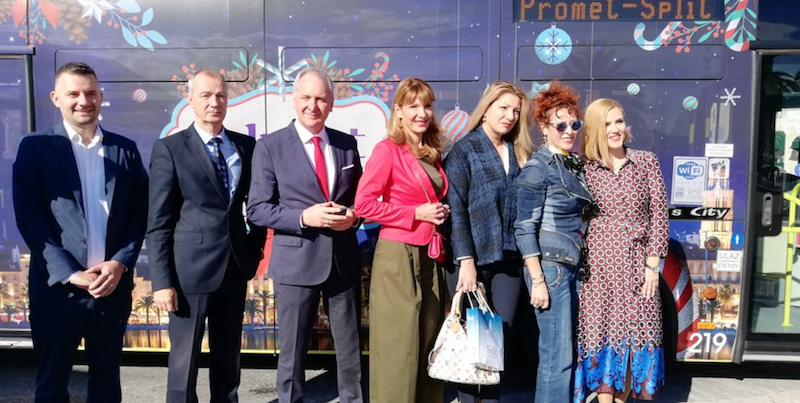
The Public Invitation for offers on Advent houses opened just a few days ago. This includes 25 houses in the following locations: Riva (3 shops, 3 for simple catering, 11 for catering); Dardin (4 catering); Rudjer Boskovic RK Prima 3 (4 catering); and at Prokurative (children's entertainment - train). Those interested can apply by November 14 and be part of this year's retro Advent story.
Maja Leksic, director of marketing and sales, said: “Radio Dalmacija lives with its listeners 24 hours a day, 365 days a year, either through the Christmas Gift project, through which we assist our fellow citizens in need, or by sharing our thirteenth salary. We always listen to the needs of our listeners, and we are especially weak when it comes to children's emotions because there is no purer emotion than that. Therefore, this year, we arranged a children's park and two playgrounds in Split, and we are the proud sponsor of the Hajduk pioneers for several years. It was, therefore, logical to respond to the invitation of the Tourist Board and participate in this year's Advent as a sponsor of Marmontova and be the exclusive media sponsor of Advent.”
More info on Split Advent coming soon...
To read more about lifestyle in Croatia, follow TCN’s dedicated page.
Split Mayor on Failed Kopilica Metro: "Line Not Discontinued, but Transformed"
November 6, 2019 - Split mayor Andro Krstulovic Opara commented on discontinuing the metro from Kopilica to the ferry port, saying that the line had not been discontinued, but only transformed into an integrated bus and rail link between the Split airport and the ferry port.
Opara explained for Slobodna Dalmacija: “You journalists called it the metro, we never called it that, it is yet to become that. The line between Kopilica and the City port has not been discontinued; it has been transformed into a transportation link connecting our airport with an integrated line. Anyone who buys a ticket at the Split airport for 25 kuna can board the train Kastel Luksic and continue to the ferry port, which has a stop in Kopilica as well.
We changed the timetable because the passenger intensity is lower and is now getting a new shape by merging Kastela, Solin, and Split, which is what we wanted. This is just the beginning of a long story that will have its finale when we connect the airport with the ferry port. We have now combined it by integrating the bus and rail,” the mayor explained.
When asked by a journalist about the difference between the metro and the line that usually departs from Kastela, stops at Kopilica and continues to the ferry port, Opara replied that, in the meantime, an integrated ticket had been released that has been used in recent weeks.
He explained that passengers now have the opportunity to take an exclusive "Promet" bus line from the airport to Kastel Luksic, and then use the same ticket for the train to the ferry port, which stops in Kopilica.
Of course, the ultimate goal is to connect the airport with the ferry port by rail, for which not all the necessary preconditions have been created, which primarily relate to the construction of part of the railway line in Kastela itself. According to the mayor, this will not happen so fast. However, Opara announced interventions that will occur around Split next year.
“During the winter, we will start the works in Dujmovača; something halted the building permits on Širina and in Sv. Kaji, but as far as I can tell, this has been resolved, so next year, we will have those two stations ready. A process is underway at Trgu hrvatske bratske zajednice to change the DPU, which is necessary to get started on opening that station.
There were two tenders for the HZPP to design the underground station, and the second one succeeded. It will give new meaning to all this work that we insist on doing,” said the mayor.
How much money would be spent on the entire project could not be said at this time, except for that Promet would participate by contributing one-third of the whole amount.
When asked if the City profited from passengers traveling between Kopilica and the ferry port this summer, Opara explained that this could not be discussed because the project has just begun.
"The project may not be as popular in the beginning as it will be in the future, but we were ready for it," he added.
Thus, connecting the airport and the ferry terminal will not be feasible until next summer.
“I have to say openly that for our part, we did everything we needed, the Ministry also, and doubts existed with our colleagues in Kastela. I am glad to hear that they have introduced a railway line in the changes to the spatial plan, which is also envisaged by the Spatial draft plan of Split-Dalmatia County. However, the tracks they offered were still under evaluation. We expect that this will take a full year and that a quality route will be decided. Until then, we will make amendments like this with integrated traffic,” Opara concluded, saying that the whole process has taken too long.
To read more about travel in Croatia, follow TCN’s dedicated page.
Split Advent 2019/20: What Can We Expect this Winter?
November 5, 2019 - Split Advent this winter will be held from November 30, 2019, to January 2, 2020.
Split Advent 2019/20 will boast nineeteen holiday houses in three locations - the Riva (11), Đardin (4), and the Split 3 neighborhood (4). On Monday, the competition for catering facilities began, reports Splitski Dnevnik.
Spalatum D.M.C. as an organizer of Split Advent 2019/20, invited all interested individuals and legal entities to submit, under general and special conditions, an offer for the display, presentation and sale of their products and services at the event from November 30, 2019 to January 2, 2020, on the Riva, Đardin, Prokurative (the plateau by FINA), and from December 6, 2019, to December 24, 2019, at Rudjer Boskovic RK Prima 3.
This year, there will be no Advent in front of the Gallery of Fine Arts due to the vibrant program and ice rink at Đardin. In addition, part of the program will be dispersed this year to the Split 3 neighborhood to provide Advent entertainment to residents outside the city center. As the stages and holiday houses will be located in a residential area, the program will last until 9 pm.
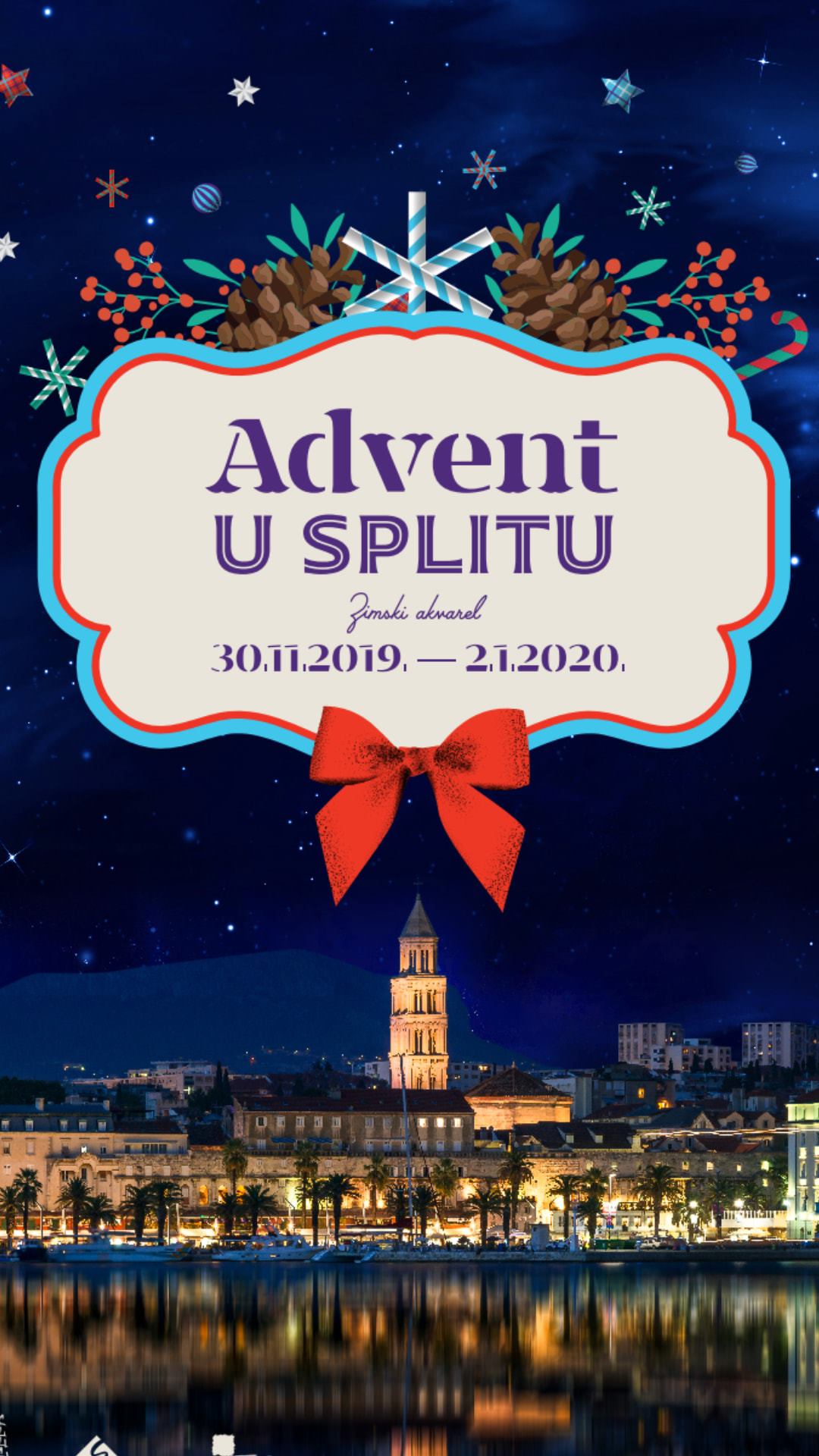
"There are no houses in front of the Gallery of Fine Arts, but we have decided to focus on the Riva, Đardin and Split 3 because of the great fluctuation of inhabitants in that part of the city. In this area, we went with a much lower price, and there will be a stage set for the music program. This is an intention to offer events outside each center and to expand zones, and to disperse some Advent events to other parts of the city, and if successful, plan to do so in other quarters in the coming years, where it is organizationally possible. Also, on the plateau in front of FINA, there will be children's content and a traditional train. The number of houses on the Riva remained the same, and the number of houses at Đardin increased,” said Ante Sunjic, director of Spalatum D.M.C., adding that the initial rental prices of houses on the Riva and Đardin remained the same as last year, and they expect the same interest.
This year, the competition is open for exhibitions, sales and presentations, including the following: Christmas products, books and multimedia, souvenirs and gifts, original products, gastronomy, and presentations by tourist boards, counties, cities, municipalities and chambers of commerce.
Interested bidders are required to send their offer to Spalatum D.M.C. or the Split Tourist Board by November 13, 2019. Bids can be submitted from November 4 to 13, 2019.
The accepted offers will be published on the websites of Spalatum D.M.C. and the Split Tourist Board on November 14, 2019.
Bids that do not meet the required conditions, which were not submitted in the required form and content or were not submitted within the prescribed deadline, will not be considered or included in the Advent program.
The main selection criterion will be the highest rent or fee offered, followed by the authenticity of the products and services being offered, as well as the content related to the Christmas holiday, creativity in the interior decoration of the buildings, previous experience in exhibiting at fairs and many years of activities for which they are applying.
If a successful tenderer withdraws their offer, the Commission reserves the right to select the next best offer.
To read more about lifestyle in Croatia, follow TCN’s dedicated page.
Unprecedented Measures in Place for Croatia Qualifier at Poljud
October 8, 2019 - Unprecedented security measures are in place for the European qualifier between Croatia and Hungary at Poljud on Thursday.
Slobodna Dalmacija announced that seats in the VIP lodge are reserved for President Kolinda Grabar-Kitarovic, Prime Minister Andrej Plenkovic, and all ministers - and it looks like Viktor Orban, the Hungarian Prime Minister, will also be coming to Split. But that's not the only reason security is on high alert.
HNS took over Poljud Stadium on Monday, and until Friday, Poljud is exclusively in the service of the national team, which requires a special regime and security.
Hajduk moved to Brac for the week. This includes not only the first team, but also the offices and services, the entire working community, while the younger teams have been moved to other locations around Dalmatia.
Hajduk has refused to participate in the organization of the national team match, and according to Croatian media, neither the Hajduk president Marin Brbić nor the vice-president Luksa Jakobusic will attend on Thursday.
Except for one case where the police found 45 tickets purchased by a single person, other such incidents have not been recorded. The Split-Dalmatia County Police Department exclaimed: ”If you do not have a ticket in your name, don't even come to the stadium."
Two to three rings of security have been announced at the stadium, and it is well known that the information on the ticket and ID must match. HNS allowed ticketholders to change the name on their ticket up to 48 hours before the match, but only within their family. Those who are not allowed to enter the stadium have the right to go to the box office and transfer the ticket to their spouse, brother, sister, child, parents, etc.
Just how meticulous the security will be, remains to be seen.
It has been announced that Victor Orban, the Hungarian Prime Minister, will attend the match with his private arrangement. The police are still awaiting official confirmation as Orban must receive proper treatment - and as much as the PM loves football, the protocol must be respected, and he cannot enter the stadium as a mere spectator.
The seats in the VIP lodge are reserved for President Kolinda Grabar-Kitarovic, Prime Minister Andrei Plenkovic, and all ministers.
Some claim that Split will witness the strongest security of a public event ever in the city. MUP will bring 500 police officers, and as of Wednesday, they will also monitor the city as two thousand Hungarian fans are expected. Police will also patrol all locations around the stadium. The caution has thus been raised to the highest level for this match, which is paid for by HNS. The final bill could reach up to three million kuna.
Police are already overseeing the Le Meridien Lav Hotel in Podstrana, where the national team is staying, and will also be monitoring the guests. Nothing will be left to chance.
The field will be monitored from the air, by drones and helicopters, from the sea by warships and from the checkpoints around it. There will also be 500 security guards in the stands and near the pitch. Sokol Maric will lead the security, but other companies have been hired as well. The stands and pitch are monitored with 'sleep’ cameras, which are put into action only when there is activity.
Split-Dalmatia County police say that everything is going well and that this security is necessary, considering 33,000 spectators and thousands of Hungarian fans are expected. Recall, at the end of May, there were 200 police officers when Croatia visited NK Omis - 150 of them monitoring the city, the hills, and the sea, and only 50 in the stadium.
To read more about sport in Croatia, follow TCN’s dedicated page.
City of Split and HNS Meet: Details Revealed
September 19, 2019 - Croatia and Hungary will meet at Poljud Stadium next month for a crucial Euro 2020 qualifier. The City of Split and HNS sat down at Poljud on Wednesday to discuss the details.
Slobodna Dalmacija and Gol.hr report that a five-hour marathon meeting was held on Wednesday at Poljud on the topic of the upcoming Croatia-Hungary match, which will be played on Thursday 10 October. The media learned at 3 pm on Wednesday that everything is going according to plan, and that they are moving to the City Administration where they will finalize the contract they had not yet signed.
Just after 10 am, executive chairman Marijan Kustic arrived at the head of a large HNS delegation, including Vlado Iveta, Niksa Martinac, Zoran Cvrk, and female representatives and match managers Helena Pushkar and Antonia Burazer, who runs the VIP.
“What are the points in the contract? The organization of the match, the items that HNS is taking over, that is what we spoke about. There is no controversy, but there are a lot of details, a lot of points, so everything took five hours,” Kustic said pleased after the meeting.
Is Hajduk still not participating in the organization of the match?
“I’d be the happiest if they chose to participate. But, we are negotiating with the City and signing a contract with them,” Kustic added.
Split Mayor of Andro Krustolovic Opara was only at the beginning of the meeting to welcome the HNS delegation to Poljud, before hurrying back to the City Administration. Thus, the details were agreed by Mate Omazic and Domagoj Maroevic, and Kustic was to join Opara at the City Administration later.
"It is important that the people and services work and cooperate and look for the best model for this to be a win-win situation," said Split Mayor Andro Krstulovic Opara. Recall, Dalmatinski Portal reported that the message ‘Opara liar - choose a side' welcomed the Split Mayor in front of Poljud Stadium on Wednesday.
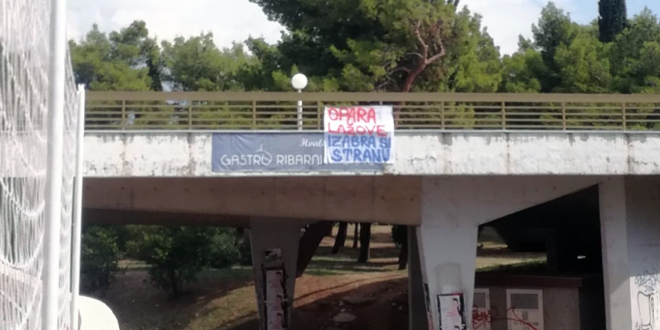
While some might think the most important win would entail qualifying points, the victories the mayor speaks of is normalizing relationships in Croatian football - and with Hajduk specifically.
"I want both Hajduk and HNS to come to the situation they announced two months ago, and I believe we are on the right track," Opara added.
"The items that HNS itself is taking over are in regards to the organization, and they are taking over some of the things that we have discussed. But in the end, we agreed on everything," he said.
Thus, the return of the Croatia national team and 2018 World Cup finalists to Poljud in Split goes its course. Tickets will be on sale from Monday and run between 100 to 250 kuna. In responding to media reports, Kustic does not believe that ticket prices are unusually high (up to 250 kuna on the day of the match).
Recall, the match at Poljud on October 10 is the return of the national team to Split for the first time since 2015. The World Cup finalists last played at Poljud in 2015 against Italy behind closed doors. Before that, they met Georgia in 2011. Both matches were played as qualifiers for the European Championships, in 2012 and 2016 respectively.
Croatia is on the verge of qualifying for the Euro once again, and every four years the national team seems to arrive back in Split.
This will be the 13th ever match played in Split, at Poljud Stadium, since Croatia gained independence.
The meeting on Wednesday was the second of such a gathering at Poljud.
To read more about sport in Croatia, follow TCN’s dedicated page.
City of Split and HNS Meet at Poljud to Discuss Upcoming Euro 2020 Qualifier
September 18, 2019 - The City of Split and the Croatian Football Federation met at Poljud Stadium on Wednesday to discuss the technical details of organizing the upcoming Euro 2020 qualifier between Croatia and Hungary.
Slobodna Dalmacija writes that the Croatian Football Federation and the City of Split should take a new step towards hosting the upcoming Euro 2020 qualifier between the national teams of Croatia and Hungary, which will be played on October 10 at Poljud. The meeting likely focused on the organization of the match.
It is necessary to emphasize that Hajduk is not involved in the organization of this match, that is, until HNS has shown serious signs towards normalizing their relationship. Recall, Hajduk previously presented their seven requirements to the umbrella football organization, which they expected to be fulfilled as a prerequisite for eventually becoming involved in the organization of this European qualifier.
Certain processes have been initiated, like the meeting in Dugopolje recently been held with HNS and the County Federation, but the results are nowhere near tangible. Thus, Hajduk will continue to hold off from jumping in on the organization of the national team match, which is here in just three weeks.
At 10:15 am Wednesday morning, an HNS delegation led by executive president Marijan Kustic and Zoran Cvrk arrived at Poljud. The representatives of the City of Split, led by Mayor Andro Krstulovic Opara, followed.
What we know thus far is that the main topic of the meeting would be to harmonize the technical details. However, some Croatian media unofficially reported that no contract had yet been signed to play the match between Croatia and Hungary at Poljud. This formality was expected on Wednesday or in the coming days.
While we await the details from the meeting, Dalmatinski Portal reported that the message ‘Opara liar - choose a side' welcomed the Split Mayor in front of Poljud Stadium on Wednesday.

Dalmatinski Portal / N.M.
Recall that Croatia and Hungary will plat at Poljud on October 10, which is the return of the national team to Split for the first time since 2015. The World Cup finalists last played at Poljud in 2015 against Italy behind closed doors. Before that, they met Georgia in 2011. Both matches were played as qualifiers for the European Championships, in 2012 and 2016 respectively.
Croatia is on the verge of qualifying for the Euro once again, and every four years the national team seems to arrive back in Split.
This will be the 13th ever match played in Split, at Poljud Stadium, since Croatia gained independence.
The meeting on Wednesday is the second of such a gathering at Poljud.
More details soon.
To read more about sport in Croatia, follow TCN’s dedicated page.


